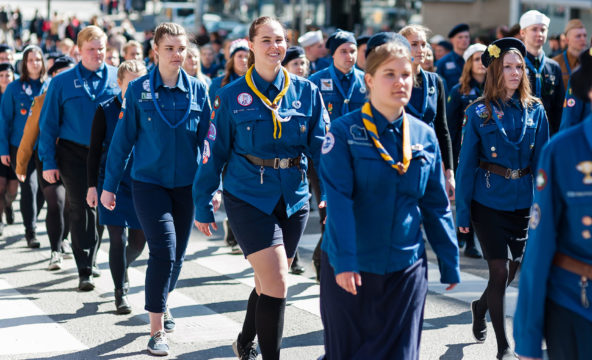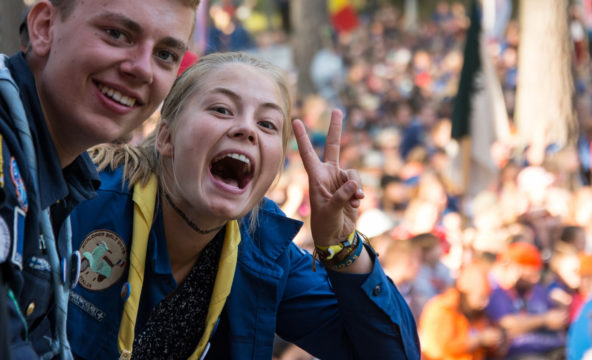Scouting is an educational movement that aims to support the development of children and young people, taking their personal characteristics into consideration. Scouting is guided by the values of the two world organisations.
Participants commit to the Scouting values by taking the Scout Promise. The promise is taken in each age group and its wording is the same for all. The ideals to which the Scouts commit are the foundation of the movement. Taking the promise and its meaning are always discussed beforehand in a way that is suitable for the age, for example, through stories or discussions. Scouting ideals and their meanings vary according to the age group.
Taking the Scout Promise and committing to related values are part of the Scout Method. The method brings you towards the primary goal: to raise young people who have balanced personalities and lifestyles, are responsible and active, and think independently as members of local, national and international communities.
Scouting is open for all in Finland. You can participate regardless of your ethnic or cultural background, language, religion or conviction, operating ability, sexual orientation, gender identity or the expression of gender.
Read also the Constitution of the Guides and Scouts of Finland. The Constitution will be updated in 2019–2020. Read more about the update process.
The aim and fundamental values of Scouting
Scouting is an educational movement that aims to support the development of children and young people by taking their personal characteristics into consideration. The goal is to bring up people who have balanced personalities and lifestyles and who are responsible, active and independent members of local, national and international communities.
The fundamental values
Scouting is guided by fundamental values determined by the two world organisations. These values are defined based on the notion of a human being facing duties with respect to God, to him/herself, to other people, to society as well as to the environment. The relation to God means harbouring a positive attitude towards religion, seeking spirituality and living in accordance with one’s own spiritual conviction and community.
The relation to self means taking responsibility for one’s personal development, willingness to accept oneself together with one’s strengths and weaknesses as well as ability to act in line with ethically correct principles. The relation to others means helping and taking care of other people as well as respecting them. The relation to society means promoting peace, understanding and cooperation between people in local, national as well as international contexts. It also comprises social activeness and loyalty towards one’s own country.
The relation to the environment means taking responsibility for one’s surroundings, promoting sustainability for the benefit of future generations as well as respecting nature.
The principles of Scouting
Scouting is voluntary and open to everyone who approves of its objectives and fundamental values.
In Finland, the target group of the movement is composed of all children and young people between 7 and 22 years of age. The activities of this group are guided and supported by adults, for whom Scouting offers opportunities for personal growth and development.
The openness of Scouting comprises the adaptation of the principle of equality to all activities and decision-making. This refers to for example regional, linguistic, cultural, religious and gender equality. The individual member is free to practice his or her own religion. The movement is independent, party-politically non-aligned as well as non-profit, and promotes the involvement of young people in decision-making at all levels.
The Ideals, Promise and Motto
The Scout Promise and Ideals describe the fundamental values of the movement in a concise manner that is easily understood by young people. Making the Scout Promise means that one voluntarily strives to commit oneself to the values of Scouting.
The Ideals are based on Robert Baden-Powell’s original Scout Law and the Promise has been derived from the original Scout Promise.
The Ideals of a Scout are
- To respect others
- To love and protect the environment
- To be reliable
- To build friendship across boundaries
- To feel one’s responsibility and to take action
- To develop oneself as a human being
- To search for truth in life
The Scout Promise
I promise to do my best to live for the good of my country and the
world, to develop in my spiritual beliefs and worldview and fulfil
the ideals of the <age group> every day.
The Motto of a Scout is
Be prepared
The Youth Programme
The Scout movement strives towards the fulfilment of its aim through a goal-oriented and progressive education of children and young people, that includes the educational objectives, the Scout method and the youth programme. The educational objectives specify the aim of Scouting, which is then reached by using the Scout method and implementing the programme activities.
The educational objectives
The educational objectives of the Guides and Scouts of Finland minutely define the aim of the education of children and young people by the means of the Scout method and the youth programme. The educational objectives concretise the aim of Scouting and are linked to time, society and culture.
The general educational objectives:
Scouting is a multifaceted leisure activity that strives to support individual growth while taking personal characteristics and stages of development into consideration. The aim of the youth programme is to educate individuals into acting responsibly and actively in relation to themselves, to other people, to society and to the environment. Scouting teaches knowledge, skills, attitudes and values that are of use for living a balanced and fulfilling life.
Relation to self
A Scout develops him/herself as a human being. (S)he takes care of him/herself and his/her personal wellbeing by adapting a healthy way of living. A Scout strives towards living a multifaceted and balanced life. Scouting provides tools for developing one’s identity, philosophy of life and relation to God. A Scout develops an understanding of right and wrong as well as ability and willingness to work for those issues (s)he perceives as important. A Scout has courage to throw him/herself into new and various situations, and (s)he uses his/her creativity. (S)he plays, uses his/her imagination and finds sensible solutions to various difficult situations. A Scout takes action. A Scout is able to provide feedback and to learn from that which (s)he receives him/herself. (S)he harbours a hopeful and goal-oriented attitude towards his/her future.
Relation to other people
A Scout helps and takes care of other people, even when that is not in line with his/her own immediate advantage. (S)he understands that cooperation with others is beneficiary. A Scout appreciates diversity and understands that people and their conceptions of the world may vary. A Scout is able to work with different kinds of people. (S)he is able to express his/her feelings and opinions in a manner appropriate to the situation at hand. A Scout is upright and honest. The exercise and promotion of justice is important to a Scout.
Relation to society
A Scout is able to act in society, to explore issues of everyday life and influence them. (S)he is able to take on various, either leading or subordinate, roles in different organisations and communities. A Scout understands official and unofficial decision-making structures.
A Scout develops his/her leadership and influencing skills, such as taking initiative, responsibility, systematic action, setting objectives and organisational ability. A Scout is interested in dealing with common issues. (S)he notices incongruities and takes action in order to correct them. A Scout wants to be part of society and his/her communities. A Scout knows and exercises his/her own culture while also appreciating and being interested in other cultures. A Scout perceives him/herself as part of humanity and feels global responsibility.
Relation to the environment
A Scout is able to move and operate in different environments. (S)he respects and is familiar with nature. A Scout enjoys spending time in nature and considers him/herself as part of it. A Scout is also interested in the welfare, cleanliness and comfort of his/her living and working environments. (S)he takes an interest in the preservation of the environment for future generations in accordance with the principles of sustainable development.
The Scout method
The Scout method is a collection of tools used by the movement in order to reach its educational objectives and thus fulfil the aim of Scouting. The Finnish Scout method is based on the Scout methods of WAGGGS and WOSM.
The Scout method consists of
- Commitment to the values of Scouting
The Scout Promise, Ideals and Motto describe the values of Scouting. By acknowledging them, a Scout commits him/herself to the values of Scouting. - Symbolism
Symbolism includes objects, contents and ways of working that have a commonly understood meaning. Symbolism links children and young people to their own group, their local group, and the global Scout movement. - Personal progression
In Scouting, each individual is entrusted with suitably challenging tasks. The programme, appropriately adapted to the needs of each age section, promotes growth and development. - The Patrol system
Scouting activities take place in peer groups, in which responsibility is shared and decisions are made together. In these small groups, children and young people learn to operate as members of a group. - Learning by doing
For children and young people, learning by doing is the natural way of learning. In Scouting, learning takes place through doing and experiencing. - A good deed every day
In Scouting, children and young people learn to take responsibility for themselves and for others. Activities aiming at the wellbeing of others serve communities and create a sense of togetherness. - Activities in nature
In Scouting, children and young people operate in nature, a working and learning environment that provides unforgettable experiences. - Adult support
In Scouting, children, young people and adults work together. The adults support the growth and participation of the children and young people, and provide possibilities to influence.
The youth programme
In Finland, the programme activities are developed and supported for the benefit of the target group of the youth programme (7 to 22-year-olds), which is divided into five age sections. In Finnish Scouting, the term “youth programme” refers to a general notion of programme, including not only all activities, events and projects but also definitions and descriptions of for example groups, leadership positions and symbolism.
The programme activities specify the Scout method.
Cooperation with churches
The Guides and Scouts of Finland has signed agreements of cooperation with the Evangelical Lutheran Church of Finland and the Finnish Orthodox Church. The purpose of the agreements is to promote the position of religious education as part of the youth programme offered by the Guides and Scouts of Finland and to agree on the principles of the cooperation. Local groups that are affiliated with a religious confession shall provide religious education following that confession. Local groups that are not affiliated with any religious confession shall support the spiritual development of their members according to the confession of those members.


